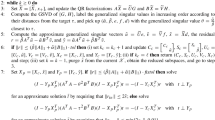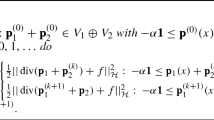Abstract
In biomedical engineering applications, high-order data, also known as tensors, are more and more popular and canonical polyadic decomposition (CPD) is one of the most powerful tool to analyze such high-dimensional high-order data. However, existing CPD algorithms suffer from a serious disadvantage: they are prone to stick into local minima and hence may result in unreasonable components that are hard to interpret. To overcome this problem, we proposed a new CPD algorithm that not only provides significantly improved stability but is also very suitable for parallel computing. The performance of the proposed algorithm was justified by using synthetic data and its applications in biomedical image denoising.



Similar content being viewed by others
Notes
Deflation means that one layer of \(\mathbf{a}_k^{\left( 1 \right) } \circ \mathbf{a}_k^{\left( 2 \right) } \circ \cdots \circ \mathbf{a}_k^{\left( N \right) } \) is estimated first and then is subtracted from the original tensor, and then the next layer of \(\mathbf{a}_{k+1}^{\left( 1 \right) } \circ \mathbf{a}_{k+1}^{\left( 2 \right) } \circ \cdots \circ \mathbf{a}_{k+1}^{\left( N \right) } \) will be estimated, and so on.
References
Cichocki, A., Zdunek, R., Phan, A.H., Amari, S.-I.: Nonnegative Matrix and Tensor Factorizations: Applications to Exploratory Multi-way Data Analysis and Blind Source Separation. Wiley, Chichester (2009)
Zhou, G., Zhao, Q., Zhang, Y., Adali, T., Cichocki, A.: Linked component analysis from matrices to high order tensors: applications to biomedical data. Proc. IEEE 104(2), 310–331 (2016)
Liu, Y., Yu, R., Pan, M., Zhang, Y., Xie, S.: Sdmac: spectrum database-driven mac protocol for cognitive machine-to-machine networks. IEEE Trans. Veh. Technol. 66(2), 1456–1467 (2017). doi:10.1109/TVT.2016.2555084
Chen, C., Liu, Z., Zhang, Y., Chen, C.L.P., Xie, S.: Saturated Nussbaum function based approach for robotic systems with unknown actuator dynamics. IEEE Trans. Cybern. 46, 2311–2322 (2016). doi:10.1109/TCYB.2015.2475363
Chen, C., Liu, Z., Zhang, Y., Chen, C. L. P., Xie, S.: Asymptotic fuzzy tracking control for a class of stochastic strict-feedback systems. IEEE Trans. Fuzzy Syst. doi:10.1109/TFUZZ.2016.2566807
Zhou, G., Cichocki, A., Zhao, Q., Xie, S.: Efficient nonnegative Tucker decompositions: algorithms and uniqueness. IEEE Trans. Image Process. 24(12), 4990–5003 (2015)
Rajwade, A., Rangarajan, A., Banerjee, A.: Image denoising using the higher order singular value decomposition. IEEE Trans. Pattern Anal. Mach. Intell. 35(4), 849–862 (2013)
Zhou, G., Cichocki, A., Zhao, Q., Xie, S.: Nonnegative matrix and tensor factorizations: an algorithmic perspective. IEEE Signal Process. Mag. 31(3), 54–65 (2014)
Li, B., Zhou, G., Cichocki, A.: Two efficient algorithms for approximately orthogonal nonnegative matrix factorization. IEEE Signal Process. Lett. 22(7), 843–846 (2015)
Zhang, Y., Zhou, G., Zhao, Q., Cichocki, A., Wang, X.: Fast nonnegative tensor factorization based on accelerated proximal gradient and low-rank approximation. Neurocomputing 198, 148–154 (2016)
Zhao, Q., Zhou, G., Zhang, L., Cichocki, A., Amari, S.: Bayesian robust tensor factorization for incomplete multiway data. IEEE Trans. Neural Netw. Learn. Syst. (2015). doi:10.1109/TNNLS.2015.2423694
Zhou, G., Cichocki, A., Zhang, Y., Mandic, D.P.: Group component analysis for multiblock data: common and individual feature extraction. IEEE Trans. Neural Netw. Learn. Syst. 27(11), 2426–2439 (2016). doi:10.1109/TNNLS.2015.2487364
Karfoul, A., Albera, L., Lathauwer, L.D.: Iterative methods for the canonical decomposition of multi-way arrays: application to blind underdetermined mixture identification. Signal Process. 91(8), 1789–1802 (2011)
Lim, L.-H., Comon, P.: Blind multilinear identification. IEEE Trans. Inf. Theory 60(2), 1260–1280 (2014)
Zhou, G., Cichocki, A.: Canonical polyadic decomposition based on a single mode blind source separation. IEEE Signal Process. Lett. 19(8), 523–526 (2012)
Zhang, Y., Zhou, G., Jin, J., Wang, M., Wang, X., Cichocki, A.: L1-regularized multiway canonical correlation analysis for SSVEP-based BCI. IEEE Trans. Neural Syst. Rehabil. Eng. 21(6), 887–896 (2013)
Lathauwer, L.D., Moor, B.D., Vandewalle, J.: A multilinear singular value decomposition. SIAM J. Matrix Anal. Appl. 21, 1253–1278 (2000)
Zhou, G., Cichocki, A., Xie, S.: Accelerated canonical polyadic decomposition by using mode reduction. IEEE Trans. Neural Netw. Learn. Syst. 24(12), 2051–2062 (2013)
Acknowledgements
The work was supported in part by the National Natural Science Foundation of China 61673124 and 61333013, the Guangdong Province Natural Science Foundation under Grant 2014A030308009 and 2014B090907010, the Foundation of Guangdong Provincial Department of Science and Technology under 15ZS0117.
Author information
Authors and Affiliations
Corresponding author
Rights and permissions
About this article
Cite this article
Xie, K., Yu, J. & Lu, C. A new canonical polyadic decomposition algorithm with improved stability and its applications to biomedical signal processing. Cluster Comput 20, 1449–1455 (2017). https://doi.org/10.1007/s10586-017-0858-8
Received:
Revised:
Accepted:
Published:
Issue Date:
DOI: https://doi.org/10.1007/s10586-017-0858-8




